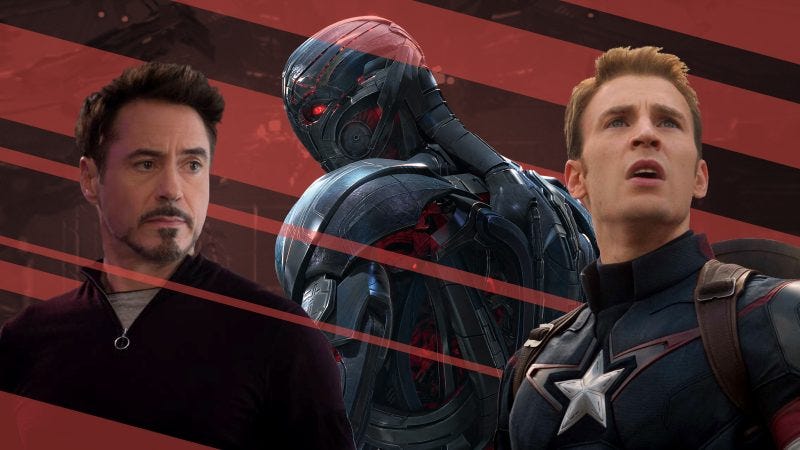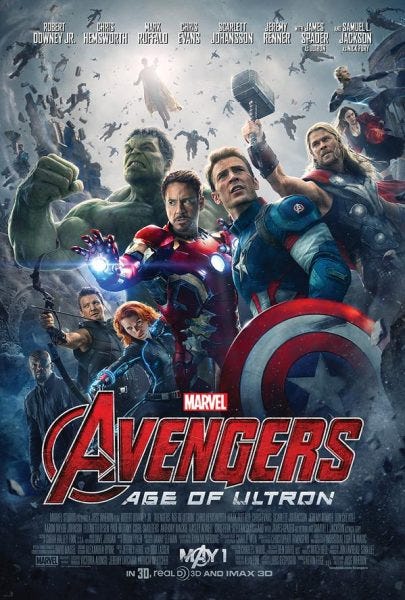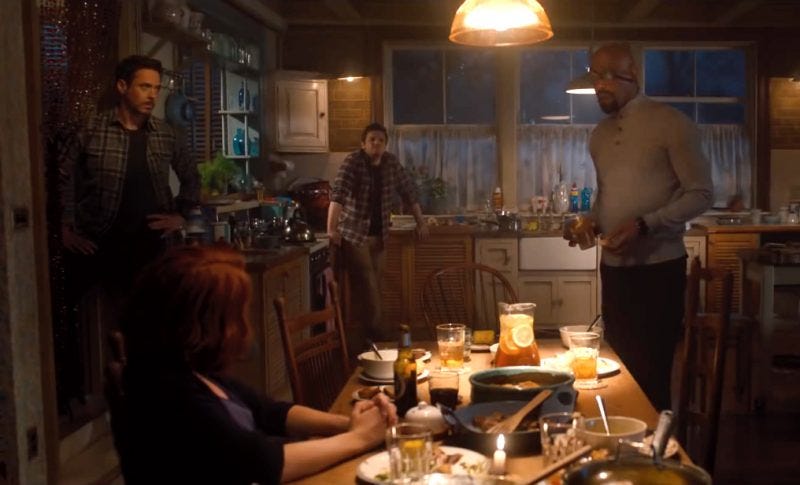MCU Retrospective, Part 12—"Avengers: Age of Ultron"

In this weekly series, Film Yap writer Andrew Carr revisits each installment of the decade-long Marvel Cinematic Universe. Once a week, Andrew will review one film in the series, in the original release order, reevaluating his previously held opinion of the film and giving each film a new score out of 5 Yaps. All 18 films (plus Avengers: Infinity War, upon release) will be compiled into one definitive ranking. Each entry in the "MCU Retrospective" series will include a short review as well as a historical recap about the film's initial conception and release.
A new entry in this series will be posted every Sunday until the weekend prior to the release of Avengers: Infinity War on May 4.
Last week's entry in the series: Guardians of the Galaxy!
Complete list of all entries in the "MCU Retrospective" series!
History Time!
In Phase 2, Marvel Studios had proved, for the most part, that they could separate the Avengers back to their solo roles and still come up with compelling stories. They also proved with Guardians of the Galaxy that there was room for other, weirder characters in the franchise too. But now now it was time to prove the Avengers could come back together when the world needed them, as Nick Fury said they would, and create a story that would live up to the legacy and influence of the 2012 original.
Hype was at an all-time high in the months leading to Age of Ultron. All the favorite heroes were returning, plus a few new ones, and the eccentric and enigmatic James Spader had been cast in the titular villain role. Trailers teased a very dark and grim challenge for our heroes to face, with Ultron being created and mistakenly set loose on the world by Tony Stark himself. "The end of the path I started us on," a line from Tony in the trailer, seemed to spell doom and finality in this entry. Ultron himself also seemed quite the terrifying villain, closing out the trailer by boasting, "There are no strings on me," which was a reference to "I've Got No Strings" from Pinocchio, a film fittingly about a puppet wanting to become human.
The film raked in $192 million in its opening weekend, missing the record-setting numbers of its predecessor by about $15 million. Critics seemed to feel about the same with AoU as they did with The Avengers (minus all the "groundbreaking" talk the former enjoyed), but fans weren't as satisfied. The film was criticized for wasting and misrepresenting the character of Ultron from the comics, and for having too much humor and levity given the darker tone that was marketed. The finale, which featured another city being destroyed by mindless drones, felt formulaic and lazy to many. In years since, Age of Ultron has consistently ranked in the bottom half-to-third of MCU films in fan and magazine rankings, being called "forgettable," "overstuffed," and "tonally inconsistent."
The Review
AVENGERS: AGE OF ULTRON (2015)

I can remember loving this film on first viewing, and being quite vocal about it being superior to its predecessor. I was personally impressed by returning director Joss Whedon's ability to expand on the characters' relationships in natural but unexpected ways, and finding interesting new settings and circumstances for both action sequences and character development.
To this day, I still have more fun with Age of Ultron than I ever did with The Avengers after first viewing. It's got more action, more unique action, better character and actor chemistry, and some interesting motifs and concepts I wouldn't expect to see in such a massive blockbuster. It's just overall more fun, and arguably more emotional, than its sluggishly-plotted and stiffly-written predecessor. Sure, The Avengers reaches more triumphant heights with its spectacular finale, but Age of Ultron looked more at the underbelly of the Avengers themselves, and spent more of its run time exploring the characters rather than just hitting expected plot beats.
Where AoU falters, and where I think most people check out, is where it tries to play "middle chapter of a franchise" where it should be focusing on its own stakes and consequences as a singular story. In the first half of the film, newcomer Scarlet Witch (Elizabeth Olsen) uses her mysterious powers to show some of the Avengers haunting visions. Most of them are self-contained character development pieces, or—in Tony's case—serve the plot. But Thor's vision sees him returning to Asgard, confronted by Heimdall and being told that he will bring death and destruction to his own people. The idea isn't revisited until Thor abruptly leaves the main plot line about two-third of the way through the film to consult with his scientist friend Edward Selvig. He goes to a magic pond in a cave and sees another, similar vision, in which we see the Infinity Stones (as named in Guardians of the Galaxy) as well as bits of Thor's previous vision. It's a strange and out-of-place sidestory that seems to add nothing to the main plot of the film, but rather serves as a teaser for what could be explored in further Thor or Avengers films. It hurts the pace of the film and makes it harder to keep track of what matters to the story. Honestly, it makes otherwise effective and important character scenes (mainly the ones at Hawkeye's farmhouse) feel similarly unimportant or forgettable.
Other signs of this "middle chapter" syndrome that Age of Ultron experiences show up in the finale. Trailers and interviews prior to the film's release seemed to indicate that the film would bring heavy consequences to our heroes. Indeed, there are some, like the Sokovia Accords in Captain America: Civil War, and the growing tension between Tony and Cap. But in terms of casualties, after Ultron's plan is predictably thwarted, the Avengers are able to just laugh it off and go back to their normal lives. Sure, new-guy Quicksilver (Aaron Taylor-Johnson) died saving Hawkeye, and it was kinda sad in the moment, but honestly, we barely knew the guy. I'm not saying Hawkeye should have died (please no, I love my Hawkeye), but maybe there was a way that Ultron could have more personally affected the Avengers in a lasting way. But in Marvel's attempt to preserve the state of things such that more movies and money could be made, Age of Ultron ends up feeling kind of insignificant, despite its self-seriousness.
Speaking of Ultron, he's a touchy subject among comic book and MCU fans. Many accused the film of wasting or ruining him. I don't agree. As said before, perhaps he could have left a stronger impression on our heroes. He was Tony's creation, after all; it would have been nice to push the emotional limits of that concept. But James Spader still absolutely rocked it in the role. The biggest complaint is that he's too funny. And yeah, Ultron is pretty funny. But not really in a laugh-out-loud, played-for-jokes kind of way; Ultron's sense of humor is a sardonic, twisted cynicism. He himself is a paradox: he is a robot created by man, designed to protect man, who wants to destroy man because he sees man as a plague on the earth, but simultaneously secretly wants to be more like man. And you can see that in every inch of Whedon's writing and Spader's performance. He references iconic works of human culture like the Bible and Pinocchio (yeah, I laughed when I put those two things next to each other too). He models his metal body after the human anatomy, despite its inherent inefficiencies. He scoffs at the idea of being one of Stark's mindless "puppets," but can't see that his personality is very similar to Tony's.
In then end, yeah, Ultron's last stand against the Avengers feels a bit too reminiscent of Loki's invasion in New York, with the hive-mind Ultron-bots and the city-destroying spectacle. Admittedly, I would have liked to see Ultron take a more subversive approach to destroying his enemy and the world, like inciting global nuclear war or something. But up until the finale, Ultron is undeniably compelling, and definitely unique among CGI robot/alien blockbuster villains. I'm still holding onto hope that Vision actually absorbed the Ultron AI at the end instead of killing it, and that maybe it will be resurrected at some point.
So that's how I feel about the film's flaws. What nobody talks about is what Age of Ultron does right. Anyone who says AoU is "slow" or "inconsistent" should rewatch The Avengers. The first 50 minutes of that film are downright difficult to sit through—bad acting, bad writing, sluggish plotting, and not much action. AoU opens on a fun fight scene that shows how the Avengers have learned to work together as a team, extrapolating from the fluid fight choreography seen in 2012's New York battle. It's cool, it's funny, it's "Avengers-y." That scene is followed up by one of the best Avengers scenes in the franchise so far: the party in Stark tower. Here, we get to see the team screwing around, having fun, and busting each other's balls while off the clock. It helps remind us that they're just people. I mean, Thor's a god, but he still gets insecure when other people try to lift his hammer.

That sense of vulnerability and humanity is on display throughout the rest of the film: each of the team members see their deepest fears and insecurities, thanks to visions from Scarlet Witch; Black Widow and Bruce Banner dance around the possibility of a romantic relationship between them; Hawkeye reveals to the team that he has a secret home, complete with a wife and kids, and then reveals to his wife how worried he is about the team's compatibility and safety; he later gives Scarlet Witch a pep talk on what it takes to be an Avenger when you're just little-bitty you. In between the explosions and spectacle, we find out, alongside our heroes, what makes them characters weak, humble, and human; and in response, they show us what makes them strong, courageous, and super.
On top of all that mushy character development crap, the action is also improved this time around. Iron Man breaks out a new suit to fight the Hulk, Captain America finally realizes the value of magnets, and Quicksilver and Scarlet Witch add new and unique power sets to the group. Hawkeye actually gets to do stuff too, which is nice. The only place where AoU's action feels pale in comparison to The Avengers is at the highest point of the finale. The swirling, slow-mo, overblown fight in the church just feels a bit too Transformers-y, especially in contrast to the astoundingly clear and straightforward style of the New York fight from the first film.
Personally, I enjoy AoU more than I enjoy The Avengers. I always have, and if this latest viewing was any indication, I probably always will. Is it as good, though? I don't know. I go back and forth constantly. On one hand, The Avengers is incredibly overrated and doesn't get enough shit for the mistakes it makes. On the other hand, it did successfully accomplish what was once thought impossible with superhero films, and AoU wasn't quite able to recapture the magic of that spectacle in its third act. But at the same time, Age of Ultron gave us a lot of things that The Avengers failed to: nuanced performances, deeper character development, clever writing, and a villain whose motivation wasn't just ruling the world for vanity's sake. It might suffer from the "franchise disease" that has toppled other properties like the DCEU and Sony's "Amazing Spider-Man" series, but they're ultimately pretty small distractions from solid character work and a willingness to break superhero formula (at least until the end).
PREVIOUS SCORE:
NEW SCORE:
The MCU Ranking!
Every week, I take each entry covered for that week and place it in an ongoing ranking, which will eventually include all 19 films.
If this were my "personal favorites" list, and not my attempt at defining my "best" list, I'd probably put Age of Ultron above The Avengers. And while I think AoU does a lot right that The Avengers didn't, I think I have to look at which film was more successful in its goal, and the answer to that is pretty definitively The Avengers. It set the bar for superhero team-up films, and while AoU challenged some of its predecessor's precedents, it kind of stumbled along the way. However, I will say AoU puts up a better fight than anyone seems to give it credit for.


